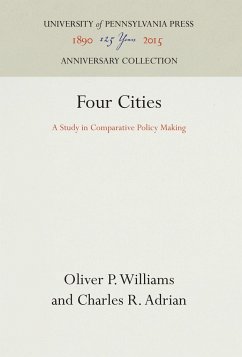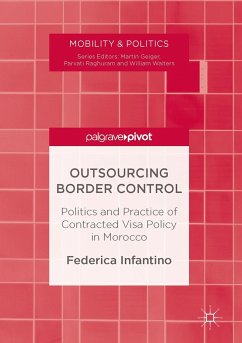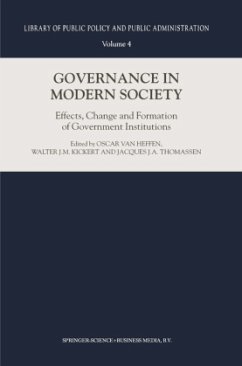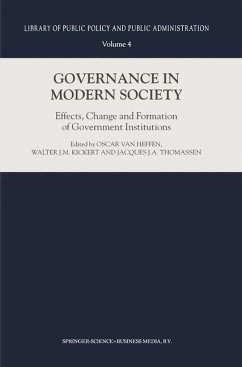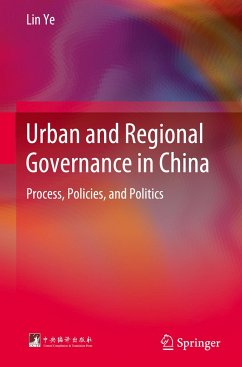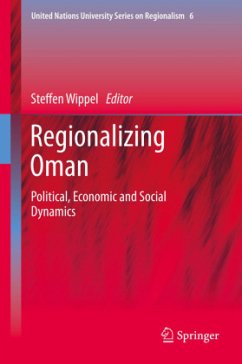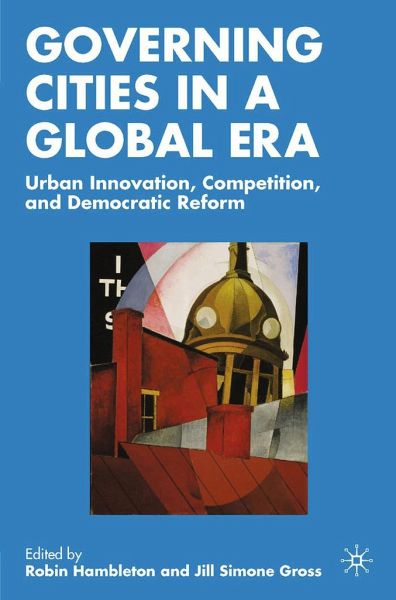
R. Hambleton
Broschiertes Buch
Governing Cities in a Global Era
Urban Innovation, Competition, and Democratic Reform
Versandkostenfrei!
Versandfertig in 6-10 Tagen
Weitere Ausgaben:

PAYBACK Punkte
19 °P sammeln!





This book is about the role that ideas, institutions, and actors play in structuring how we govern cities and, more specifically, what projects or paths are taken. Global changes require that we rethink governance and urban policy, and that we do so through the dual lens of theory and practice.
Jill Simone Gross is an Associate Professor of Political Science in the Department of Urban Affairs and Planning at Hunter College of the City University of New York, USA, and has taught at Barnard College, Columbia University, New York University, Queens College and Brooklyn College. She teaches and conducts research in comparative urban politics and development in Western European and North American cities, with an emphasis on issues of equity and inclusion. Robin Hambleton is Professor of City Leadership in the Faculty of Environment and Technology at the University of the West of England, Bristol and Director of Urban Answers - a private UK based company. He was Dean of the College of Urban Planning and Public Affairs (CUPPA) at the University of Illinois at Chicago until 2007. He now holds Visiting Professorships in Urban Planning and Policy and in Public Administration at CUPPA, and a Visiting Professorship in City Planning in the College of Architecture and Urban Planning at Tongji University, Shanghai, China.
Produktdetails
- Verlag: Palgrave Macmillan / Palgrave Macmillan US / Springer Palgrave Macmillan
- Artikelnr. des Verlages: 978-1-349-53641-2
- 1st ed. 2007
- Seitenzahl: 267
- Erscheinungstermin: 28. Januar 2008
- Englisch
- Abmessung: 235mm x 155mm x 15mm
- Gewicht: 413g
- ISBN-13: 9781349536412
- ISBN-10: 1349536415
- Artikelnr.: 45080880
Herstellerkennzeichnung
Libri GmbH
Europaallee 1
36244 Bad Hersfeld
gpsr@libri.de
'This volume by first rate scholars about one of the great transformations of our time is a worthy addition. It is essential reading for students of comparative urban politics, international political economy and urban development. The volume's good organization and the accessibility of most of the chapters make this a suitable book for classroom use' - Cities: The International Journal of Urban Policy and Planning
'In the year in which the urban population of the planet exceeds the rural for the first time this book gives us many insights into the new challenges that city leaders and policy makers now face. By examining the experiences of very different metropolitan areas in different parts of the world Hambleton and Gross lead us
'In the year in which the urban population of the planet exceeds the rural for the first time this book gives us many insights into the new challenges that city leaders and policy makers now face. By examining the experiences of very different metropolitan areas in different parts of the world Hambleton and Gross lead us
Mehr anzeigen
in an exploration of the most relevant issues concerning urban governance in a time of rapid globalization. The case study illustrations and theoretical reflections demonstrate how important it now is to engage in cross-national learning, not just to understand urban phenomena but also to create the capacity to govern effectively in modern time.' - Professor Sandro Balducci, Head of the Department of Architecture and Planning, Milan Polytechnic, Italy
'This book provides invaluable insights on the changing dynamics of city development in different continents. The various chapters provide many helpful suggestions for city leaders on how to respond to the major urban challenges we now face. The Chinese experience is valuable for examining and sharing.' - Dr. Baoxing Qiu, Deputy Minister, Ministry of Construction, China
'The world is now urban and the largest cities have formed a global connective tissue that is stronger than nation states. As big cities enter a global era they struggle with their parochial mission of meeting the needs of their local communities. But what is local in a global era? Is it a region, a mega-region or a system of cities? These are the issues of governance that Hambleton and Gross tackle with insight, breadth and depth. This book provides an important contribution that will be of interest to all concerned about the future of cities' - Edward J. Blakely, Professor of Urban Planning and Policy, University of Sydney, Australia and Executive Director Recovery, City of New Orleans, USA
'This is a "must buy" book for those who care about cities and the future of cities. By bringing together contributions from leading urban scholars in different continents the editors illuminate the challenges now facing city leaders in a refreshing and inventive way. The forces of globalization gather pace but, as the authors of this volume show with great insight, this does not mean that everywhere has to become the same. Luckily cities are different. I recommend this book to readers from north and south, east and west.' - Suketu Mehta, Author of Maximum City. Bombay Lost and Found (Vintage Books, New York, 2004)
'This ambitious book on cities aims to achieve truly international coverage of the challenges posed by globalization, demographic change, social diversity, economic competition, growing inequality and contemporary governance reforms. Using case studies of individual cities and comparisons between cities, the authors identify trends, innovations and contradictions. With significant contributions from Hambleton and Gross, they critically reappraise prevalent theories, reflect on policy and practice, and suggest how the challenges might be tackled more effectively and equitably. Academics, policy makers and opinion formers from around the world will find much to interest, disturb and inspire them in this book.' - Carole Rakodi, Professor, Department of International Development, School of Public Policy, University of Birmingham, UK
'Cities have become the strategic spaces where global forces shape current events, often in unexpected ways. New intercity geographies span 'the globe, making trans-local processes and relations part of the urban social, economic and political life. Hambleton and Gross have brought together a diverse abd international group of authors to provide us with one of the best books on the challenges of governing cities in a global era.' - Saskia Sassen, author of Territory, Authority, Rights
'Hambleton and Gross have brought us a big book with a grand sweep. The editors and authors of this volume breathe new life into globalization and the city's response to it. They illuminate globalization's uneven effects showing how governmental responses differ in advanced, transitional and underdeveloped cities. This important collection is the product of an international cast of authors who not only cover a lot of ground, but do it with aplomb and incisiveness. Scholars and policy makers would do well to discover its lessons.' - Hank Savitch, Brown and Williamson Distinguished Research Professor, School of Urban and Public Affairs, University of Louisville, USA
'Practitioners such as mayors, city managers, city planners and community organizers would to well to study this book closely. It covers major issues - such as the need to provide both efficiency and democracy, legitimacy and participation - and discusses in realistic terms the stress upon city governance. I expect it to be an important book for more than a decade and to spawn debates farther into the future.' - Dick Simpson, Professor and Department Head, Department of Political Science, University of Illinois at Chicago, USA
'This book opens an interesting discussion about urban governance which concerns not only cities of the northern hemisphere, but also those in the southern regions of the world. Furthermore, Hambleton and Gross introduce a wide variety of cases that challenge us to adopt a more critical attitude to the globalization process and to consider new vocations that could be developed to improve the quality of life in cities given current international pressures.' - Sergio Zermeño, Researcher, Social Research Institute, National Autonomous University of Mexico
Distilling common themes from such a large and disparate group of research papers is always a challenge. The editors of this book must be complemented for having so seamlessly and adroitly integrated the articles into three thematic sections that can reveal the challenges globalisation and urbanisation pose for social and economic change in the twenty-first century...[a] stellar contribution to scholarship.' In-Spire Journal of Law, Politics and Societies
'This book provides invaluable insights on the changing dynamics of city development in different continents. The various chapters provide many helpful suggestions for city leaders on how to respond to the major urban challenges we now face. The Chinese experience is valuable for examining and sharing.' - Dr. Baoxing Qiu, Deputy Minister, Ministry of Construction, China
'The world is now urban and the largest cities have formed a global connective tissue that is stronger than nation states. As big cities enter a global era they struggle with their parochial mission of meeting the needs of their local communities. But what is local in a global era? Is it a region, a mega-region or a system of cities? These are the issues of governance that Hambleton and Gross tackle with insight, breadth and depth. This book provides an important contribution that will be of interest to all concerned about the future of cities' - Edward J. Blakely, Professor of Urban Planning and Policy, University of Sydney, Australia and Executive Director Recovery, City of New Orleans, USA
'This is a "must buy" book for those who care about cities and the future of cities. By bringing together contributions from leading urban scholars in different continents the editors illuminate the challenges now facing city leaders in a refreshing and inventive way. The forces of globalization gather pace but, as the authors of this volume show with great insight, this does not mean that everywhere has to become the same. Luckily cities are different. I recommend this book to readers from north and south, east and west.' - Suketu Mehta, Author of Maximum City. Bombay Lost and Found (Vintage Books, New York, 2004)
'This ambitious book on cities aims to achieve truly international coverage of the challenges posed by globalization, demographic change, social diversity, economic competition, growing inequality and contemporary governance reforms. Using case studies of individual cities and comparisons between cities, the authors identify trends, innovations and contradictions. With significant contributions from Hambleton and Gross, they critically reappraise prevalent theories, reflect on policy and practice, and suggest how the challenges might be tackled more effectively and equitably. Academics, policy makers and opinion formers from around the world will find much to interest, disturb and inspire them in this book.' - Carole Rakodi, Professor, Department of International Development, School of Public Policy, University of Birmingham, UK
'Cities have become the strategic spaces where global forces shape current events, often in unexpected ways. New intercity geographies span 'the globe, making trans-local processes and relations part of the urban social, economic and political life. Hambleton and Gross have brought together a diverse abd international group of authors to provide us with one of the best books on the challenges of governing cities in a global era.' - Saskia Sassen, author of Territory, Authority, Rights
'Hambleton and Gross have brought us a big book with a grand sweep. The editors and authors of this volume breathe new life into globalization and the city's response to it. They illuminate globalization's uneven effects showing how governmental responses differ in advanced, transitional and underdeveloped cities. This important collection is the product of an international cast of authors who not only cover a lot of ground, but do it with aplomb and incisiveness. Scholars and policy makers would do well to discover its lessons.' - Hank Savitch, Brown and Williamson Distinguished Research Professor, School of Urban and Public Affairs, University of Louisville, USA
'Practitioners such as mayors, city managers, city planners and community organizers would to well to study this book closely. It covers major issues - such as the need to provide both efficiency and democracy, legitimacy and participation - and discusses in realistic terms the stress upon city governance. I expect it to be an important book for more than a decade and to spawn debates farther into the future.' - Dick Simpson, Professor and Department Head, Department of Political Science, University of Illinois at Chicago, USA
'This book opens an interesting discussion about urban governance which concerns not only cities of the northern hemisphere, but also those in the southern regions of the world. Furthermore, Hambleton and Gross introduce a wide variety of cases that challenge us to adopt a more critical attitude to the globalization process and to consider new vocations that could be developed to improve the quality of life in cities given current international pressures.' - Sergio Zermeño, Researcher, Social Research Institute, National Autonomous University of Mexico
Distilling common themes from such a large and disparate group of research papers is always a challenge. The editors of this book must be complemented for having so seamlessly and adroitly integrated the articles into three thematic sections that can reveal the challenges globalisation and urbanisation pose for social and economic change in the twenty-first century...[a] stellar contribution to scholarship.' In-Spire Journal of Law, Politics and Societies
Schließen
Für dieses Produkt wurde noch keine Bewertung abgegeben. Wir würden uns sehr freuen, wenn du die erste Bewertung schreibst!
Eine Bewertung schreiben
Eine Bewertung schreiben
Andere Kunden interessierten sich für




